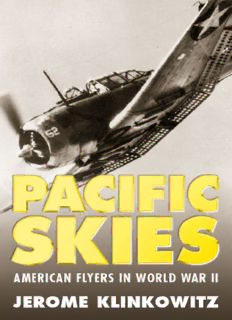
Pacific Skies: American Flyers in World War II PDF
Preview Pacific Skies: American Flyers in World War II
PACIFIC SKIES This page intentionally left blank PACIFIC SKIES AMERICAN FLYERS IN WORLD WAR II J J J JEROME KLINKOWITZ UNIVERSITY PRESS OF MISSISSIPPI / JACKSON www.upress.state.ms.us Designed by Todd Lape The University Press ofMississippi is a member ofthe Association ofAmerican University Presses. Copyright © by University Press ofMississippi All rights reserved Manufactured in the United States ofAmerica ∞ Library ofCongress Cataloging-in-Publication Data Klinkowitz,Jerome. Pacific skies :American flyers in World War II / Jerome Klinkowitz. p.cm. Includes bibliographical references and index. ISBN ---(alk.paper) .World War,–—Aerial operations,American. .World War,–—Campaigns—Pacific Area. .World War,–—Personal narratives,American. I.Title. D.K .'—dc British Library Cataloging-in-Publication Data available FOR DICK AND SANDY This page intentionally left blank C O N T E N T S Preface Acknowledgments Abbreviations J INTRODUCTION 3 A World Away from War J GOING TO WAR IN PEACETIME 33 J AN AIR WAR AT SEA AND ON LAND 78 J TALES OF THE SOUTH PACIFIC 122 J ENDGAME 167 Kamikazes and the Bombing of Japan J CONCLUSION 227 Dimensions Moral and More Bibliography Index This page intentionally left blank P R E FA C E Americans know well the pictures of their country’s air war in the Pacific,from the battleship Arizonabillowing smoke caused by a Japanese bomber’s hit and settling to the bottom of Pearl Harbor on December ,,to the mushroom cloud rising over Hiroshima on August , . Between these two events, many know the map like the back of their hand:the enemy’s opening thrust, halfway across the ocean toward the continental United States, followed by the long but persistent drive of American forces toward Tokyo.Most know the plot for this action as well, a master narrative intoned by television documentaries such as Air Power and Victory at Sea that explains the greater sense of these operations even as viewers see the familiar images in motion. But what of the individuals who fought this war—particu- larly from the air,where photography was often limited to gun- camera footage and pinpoint air reconnaissance, where maps were a business of navigational specifics and target coordinates, and where war correspondents (with their own master narra- tives) could only on the rarest occasion fly along? For flyers who fought World War II in the skies over the Pacific, a medium other than picture taking or map making would have to convey ix
Description: